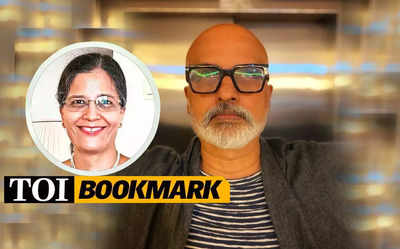Listen here:
Excerpts from the interview:
Q: This latest volume, which is so slim but packs quite a punch, is quite a distillation of your work, isn’t it?
A: Yeah, I think it is. And I think it’s also a kind of departure from earlier books in a sense that there’s a new element in these poems—humor and a kind of lightheartedness, which I don’t think I was partial to earlier. It’s not heavy-handed at all. And I think it has to do with age. It’s about having done this for many years and no longer feeling the pressure of having to prove yourself as you do when you’re a younger poet.
Q: What you did here is play so much with technique. It was very difficult to scan your poetry. What’s your take on that?
A: Yeah, that’s exactly right. Actually, scansion wasn’t something I was aiming for with this book. In fact, the only poem that scans in a traditional way is the last poem, Saviour Brisé for Another Day, which is in dactylic meter. Other than that, the scansion is quite unconventional. There are poems that are deliberately written with jagged right-hand margins, where long lines are juxtaposed with very short lines, giving you the springy rhythm of prose. But I also think, especially in a poem like 1325, which has very jagged, uneven lines throughout, it draws the eye to the next line and propels you down the page.
Q: From being a poet to a novelist, how has the journey been?
A: I think the thing is, I’ve never compartmentalised the different things. I don’t think, “Okay, today I’m a poet,” or “Today I’m a novelist,” or “Today I’m a musician.” I just work every day. Sometimes it’s one thing that you pursue over years, if it’s a novel. Other times, you’re working on several things simultaneously. You just do whatever you’re doing that day or those few days, and you bring the same things to it. You bring the same kind of obsessions, and the same kind of interests and the same tools as a writer to each of those things. And I think actually that’s a much healthier way to go about it. Because if you let yourself think, “Okay, today I have to be a poet,” I think that might just make it very difficult to write poetry.
Q: What does it mean for you to be a poet? What is the role of a poet in contemporary society for you?
A: I think the reason we revere poets and admire them is one very simple thing: we know that people don’t write poetry for commercial reasons. That’s the one thing poetry doesn’t do—it doesn’t make you money. And the minute you hear that somebody has been a poet for years, you know that this person is driven by a need that is very different from the need that drives most people, which is success, a job, money, a new car, and all those things. And it frees poets in a way and makes us revere them. If it weren’t for poetry, what would we do?
I think poetry gives us a kind of comfort and a lens to view an often-horrific world. It functions in the same way that prayer does. If you’re lucky enough to receive a poem in the way it’s meant to be received, they work on the mind in the same way that prayers do. Poems use rhythm and rhyme to make it easy for us to memorise and to make it something that lands in the brain, almost like an earworm that you find difficult to dislodge. Poems use the same tools as prayers.
Q: There is this coexistence of the sacred and the secular in your personality, which you bring out in your discussions about your poems. Is there something to that?
A: I try not to make much of it, but it’s certainly an element in my writing. I think it’s something we’re always conscious of. We yearn to know God, and we may be successful in this, or we may fail more often than not. But it’s a human yearning to know something greater than yourself, to understand why you’re here, and to feel in touch with the world around you. Sometimes God is nature. Even appreciating a dragonfly, for example, and seeing the intricate mechanism that goes into the creation of a dragonfly—its double set of wings, long body, and almost extraterrestrial look. You look at a dragonfly and realise that God is all around you. And that’s something we all share. It has nothing to do with which religion you practice.
Q: You often talk about poetry movements and you’ve written extensively about them. Do we have poetry movements/schools in India today?
A: No, we don’t. And I don’t know if that’s a bad thing. I think the internet has leveled the field in so many ways. Back in the day, if you were working on poems or working on a book of poems, it would take a long time before it was out in the world. You could, of course, make copies and give them away to your friends, but it would take a long time before those poems were seen by others. Today, it’s a matter of two clicks, and your poem is up there, and people respond to it. It just removes gatekeepers from the world of poetry and the people who want to police poetry. One of the spin-offs of that is the absence of schools of poetry. Unless you think of groups around a certain figure on social media, but those aren’t really schools.
Q: One of your regular critiques of the Bombay School of Poets was how institutionalised it had become around a few individuals, and it was only some of the seniors, including Dom Moraes, who were willing to reach out to up-and-coming poets, wasn’t it?
A: Yeah, absolutely. When he came across an interesting younger poet, he did everything he could to help them, find publishers, and introduce them to other writers. I think he felt that it was his duty to do that. And he felt that way because when he was young, older poets helped him. In fact, when he was 16 or 18, he was being published by venerable older poets like Stephen Spender. That’s why he was so generous with younger poets. And you know, even today, we have conversations about Dom and how closely he read your work and commented on it. It really was like going to poetry school. And more than learning meter, technique, and form, what you were learning was the invaluable lesson of how to live your life as a poet.
Q: Is that something you also hope to achieve with the volume you published in 2022, The Penguin Book of Indian Poets?
A: Yeah, exactly. In fact, the ages of the poets in the book varied widely. One of the poets was 20 years old, and the oldest poet in that book was Nissim Ezekiel. The difference in their birth years was something like half a century. If you come across a good poem, you know it immediately. You can feel it. Emily Dickinson once said that she knows she’s reading poetry when she feels the top of her head flying off. She feels it in the body. And I think that’s absolutely true of poetry. It doesn’t matter whether the poet who has that effect on you is 15 or 50; they inhabit the same space in your head.
Q: Does the principle of selection of poems differ when you’re putting together an anthology, such as the Penguin book, and a collection of your own poetry?
A: I think it’s a good practice to throw away as much as you keep and only keep the good ones. If I was thinking about page count, this book would have been 120 pages rather than 90. It’s really a question of “less is more.” I think that applies to the anthology as well. Although the anthology is 900 pages and covers a world of poets. And I can honestly say that there isn’t a poem in that book, even now, years after putting it together, that I feel should not be there. And that’s saying a lot.




